| Listing 1 - 10 of 11 | << page >> |
Sort by
|
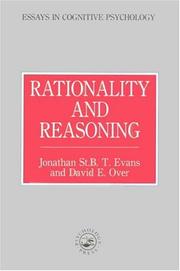
ISBN: 0863774377 Year: 1996 Publisher: Hove : Psychology Press,
Abstract | Keywords | Export | Availability | Bookmark
 Loading...
Loading...Choose an application
- Reference Manager
- EndNote
- RefWorks (Direct export to RefWorks)
Reasoning --- Reasoning (Psychology) --- Thought and thinking --- Raisonnement --- Raisonnement (Psychologie) --- Pensée --- Pensée
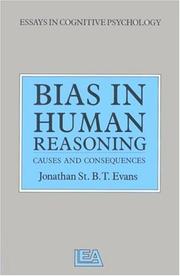
ISBN: 0863771564 0863771068 9780863771569 Year: 1989 Publisher: London LEA
Abstract | Keywords | Export | Availability | Bookmark
 Loading...
Loading...Choose an application
- Reference Manager
- EndNote
- RefWorks (Direct export to RefWorks)
Reasoning (Psychology) --- Raisonnement (Psychologie) --- Cognitive psychology --- Logic --- Logique --- Psychological aspects --- Aspect psychologique --- Common Sense Reasoning --- Artificial intelligence --- Intelligence
Periodical
Abstract | Keywords | Export | Availability | Bookmark
 Loading...
Loading...Choose an application
- Reference Manager
- EndNote
- RefWorks (Direct export to RefWorks)
Thinking & Reasoning is an international journal dedicated to the understanding of human thought processes, with particular emphasis on studies on reasoning. Whilst the primary focus is on psychological studies of thinking, contributions are welcome from philosophers, artificial intelligence researchers and other cognitive scientists whose work bears upon the central concerns of the journal. Topics published in the journal include studies of deductive reasoning, inductive reasoning, problem solving, decision making, probability judgement, conceptual thinking and the influence of language and culture on thought.
Cognitive psychology --- Thought and thinking --- Reasoning (Psychology) --- Pensée --- Raisonnement (Psychologie) --- Periodicals. --- Périodiques --- Arts and Humanities --- Language & Linguistics --- Health Sciences --- Psychiatry & Psychology --- Arts and Humanities. --- Language & Linguistics.

ISBN: 1841693103 0415654017 9786610142538 1135425698 1280142537 0203506936 113542568X 9780203506936 9781841693101 9781135425692 9781280142536 661014253X 9781135425647 9781135425685 9780415654012 Year: 2013 Publisher: Hove Psychology Press
Abstract | Keywords | Export | Availability | Bookmark
 Loading...
Loading...Choose an application
- Reference Manager
- EndNote
- RefWorks (Direct export to RefWorks)
This collection brings together a set of specially commissioned chapters from leading international researchers in the psychology of reasoning. Its purpose is to explore the historical, philosophical and theoretical implications of the development of this field. Taking the unusual approach of engaging not only with empirical data but also with the ideas and concepts underpinning the psychology of reasoning, this volume has important implications both for psychologists and other students of cognition, including philosophers. Sub-fields covered include mental logic, mental models, rational analy
Raisonnement (Psychologie) --- Reasoning (Psychology) --- Redenering (Psychologie) --- Reasoning (Psychology). --- Thought and thinking --- Cognitive psychology --- Psychology --- verkeer --- transport --- Modèles théoriques --- Raisonnement --- Dimension historique --- Processus cognitif --- Aspect psychologique.
Book
ISSN: 07780451 ISBN: 2804134717 276131090X 9782804134716 Year: 1999 Publisher: Bruxelles : De Boeck Université,
Abstract | Keywords | Export | Availability | Bookmark
 Loading...
Loading...Choose an application
- Reference Manager
- EndNote
- RefWorks (Direct export to RefWorks)
Critical thinking --- Thought and thinking --- Pensée critique --- Pensée --- Study and teaching --- Etude et enseignement --- Pensée critique --- Pensée --- Réflexion --- Apprentissage, psychologie de l' --- Esprit critique -- étude et enseignement (supérieur) --- Raisonnement (psychologie)
Book
ISBN: 2804130134 9782804130138 Year: 1998 Volume: *5 Publisher: Paris De Boeck
Abstract | Keywords | Export | Availability | Bookmark
 Loading...
Loading...Choose an application
- Reference Manager
- EndNote
- RefWorks (Direct export to RefWorks)
Cognitive psychology --- Comportement --- Gedragswetenschap --- Logica --- Logique --- Thinking --- Decision Making --- Problem Solving --- Cognition --- Reasoning (Psychology) --- Decision making --- Problem solving --- Raisonnement (Psychologie) --- Prise de décision --- Résolution de problème --- Psychologie cognitive --- Raisonnement --- Resolution de probleme --- #PBIB:1999.2 --- Prise de décision --- Résolution de problème --- Thinking. --- Decision Making. --- Problem Solving.
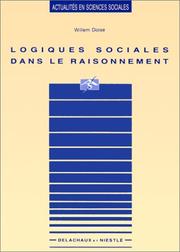
ISBN: 2603009206 9782603009208 Year: 1993 Publisher: Lausanne ; Paris : Delachaux & Niestlé,
Abstract | Keywords | Export | Availability | Bookmark
 Loading...
Loading...Choose an application
- Reference Manager
- EndNote
- RefWorks (Direct export to RefWorks)
Social sciences research --- Social psychology --- Cognition --- Social choice --- Psychologie sociale --- Choix collectif --- Social aspects --- Decision making --- Aspect social --- Prise de décision --- Groupes, Dynamique des --- Décision de groupe --- Raisonnement (Psychologie) --- Aspect psychologique --- Ontwikkelingspsychologie --- sociale en morele ontwikkeling --- sociale en morele ontwikkeling. --- Prise de décision --- Groupes, Dynamique des - Aspect psychologique
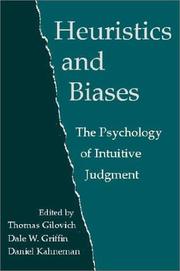
ISBN: 0521796792 9780521796798 0521792606 9780521792608 1139636812 1139638653 1139641492 0511808097 1139648144 1139649116 9780511808098 Year: 2002 Publisher: Cambridge Cambridge University Press
Abstract | Keywords | Export | Availability | Bookmark
 Loading...
Loading...Choose an application
- Reference Manager
- EndNote
- RefWorks (Direct export to RefWorks)
Is our case strong enough to go to trial? Will interest rates go up? Can I trust this person? Such questions - and the judgments required to answer them - are woven into the fabric of everyday experience. This book, first published in 2002, examines how people make such judgments. The study of human judgment was transformed in the 1970s, when Kahneman and Tversky introduced their 'heuristics and biases' approach and challenged the dominance of strictly rational models. Their work highlighted the reflexive mental operations used to make complex problems manageable and illuminated how the same processes can lead to both accurate and dangerously flawed judgments. The heuristics and biases framework generated a torrent of influential research in psychology - research that reverberated widely and affected scholarship in economics, law, medicine, management, and political science. This book compiles the most influential research in the heuristics and biases tradition since the initial collection of 1982 (by Kahneman, Slovic, and Tversky).
Reasoning (Psychology) --- Critical thinking. --- Jugement --- Raisonnement (Psychologie) --- Pensée critique --- Reasoning (Psychology). --- Pensée critique --- Judgment. --- Experimentele psychologie --- denken, begripsvorming en problem solving. --- Microeconomics --- Theory of knowledge --- Critical thinking --- Judgment --- Thought and thinking --- Critical reflection --- Reflection (Critical thinking) --- Reflection process --- Reflective thinking --- Thinking, Critical --- Thinking, Reflective --- Reflective learning --- Judgement --- Knowledge, Theory of --- Language and languages --- Psychology --- Wisdom --- Raisonnement --- Evaluative thinking --- Health Sciences --- Psychiatry & Psychology --- Processus cognitif --- Resolution de problemes --- Jugement. --- Esprit critique. --- Aspect psychologique.
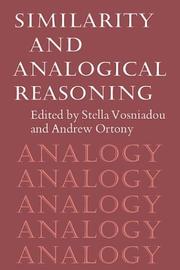
ISBN: 0521389356 0521362954 0511529864 0511875045 Year: 1989 Publisher: Cambridge Cambridge University Press
Abstract | Keywords | Export | Availability | Bookmark
 Loading...
Loading...Choose an application
- Reference Manager
- EndNote
- RefWorks (Direct export to RefWorks)
Similarity and analogy are fundamental in human cognition. They are crucial for recognition and classification, and have been associated with scientific discovery and creativity. Successful learning is generally less dependent on the memorization of isolated facts and abstract rules than it is on the ability to identify relevant bodies of knowledge already stored as the starting point for new learning. Similarity and analogy play an important role in this process - a role that in recent years has received much attention from cognitive scientists. Any adequate understanding of similarity and analogy requires the integration of theory and data from diverse domains. This interdisciplinary volume explores current developments in research and theory from psychological, computational, and educational perspectives, and considers their implications for learning and instruction. Well-known cognitive scientists examine the psychological processes involved in reasoning by similarity and analogy, the computational problems encountered in simulating analogical processing in problem solving, and the conditions promoting the application of analogical reasoning in everyday situations.
Cognitive psychology --- Comparison (Psychology) --- Similarity (Psychology) --- Analogy --- Reasoning (Psychology) --- Learning, Psychology of --- Comparaison (Psychologie) --- Similarité (Psychologie) --- Analogie --- Raisonnement (Psychologie) --- Psychologie de l'apprentissage --- Congresses. --- Congrès --- Cognition. --- Learning. --- -Comparison (Psychology) --- -Learning, Psychology of --- -Reasoning (Psychology) --- -Similarity (Psychology) --- -Paired-association learning --- Perception --- Thought and thinking --- Learning --- Psychology of learning --- Educational psychology --- Comprehension --- Learning ability --- Attention --- Consciousness --- Knowledge, Theory of --- Psychology --- Reasoning --- Memory Training --- Phenomenography --- Training, Memory --- Memory Consolidation --- Education --- Cognitive Function --- Cognitions --- Cognitive Functions --- Function, Cognitive --- Functions, Cognitive --- Congresses --- Psychological aspects --- Analogieën (psychologie) --- Analoog redeneren --- Denkprocessen --- -Congresses --- Analogieën (psychologie). --- Analoog redeneren. --- Denkprocessen. --- Similarité (Psychologie) --- Congrès --- Cognition --- Paired-association learning --- Life Sciences --- General and Others
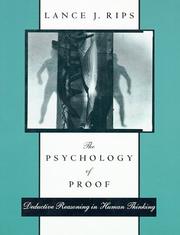
ISBN: 0585099316 0262282410 0262181533 0262517213 9780262282413 9780585099316 9780262181532 9780262517218 Year: 1994 Publisher: Cambridge (Mass.): MIT press
Abstract | Keywords | Export | Availability | Bookmark
 Loading...
Loading...Choose an application
- Reference Manager
- EndNote
- RefWorks (Direct export to RefWorks)
Reasoning (Psychology) --- Logic --- Mental Processes --- Philosophy --- Psychological Phenomena and Processes --- Humanities --- Psychiatry and Psychology --- Thinking --- Social Sciences --- Psychology --- Logics --- Critical Thinking --- Thinking Skills --- Thinking Skill --- Thinking, Critical --- Psychologic Processes and Principles --- Philosophical Overview --- Hedonism --- Stoicism --- Overview, Philosophical --- Overviews, Philosophical --- Philosophical Overviews --- Philosophies --- Human Information Processing --- Information Processing, Human --- Argumentation --- Deduction (Logic) --- Deductive logic --- Dialectic (Logic) --- Logic, Deductive --- Raisonnement (Psychologie) --- Redenering (Psychologie) --- -Logic --- Reasoning (Psychology). --- Thought --- Thoughts --- Psychologic Processes --- Psychological Processes --- Phenomena, Psychological --- Processes, Psychologic --- Processes, Psychological --- Psychological Phenomenas --- Psychological Processe --- Pharmacy Philosophy --- Pharmacy Philosophies --- Philosophies, Pharmacy --- Philosophy, Pharmacy --- Intellect --- Science --- Reasoning --- Thought and thinking --- Methodology --- Cognitive psychology --- Logic.
| Listing 1 - 10 of 11 | << page >> |
Sort by
|

 Search
Search Feedback
Feedback About UniCat
About UniCat  Help
Help News
News